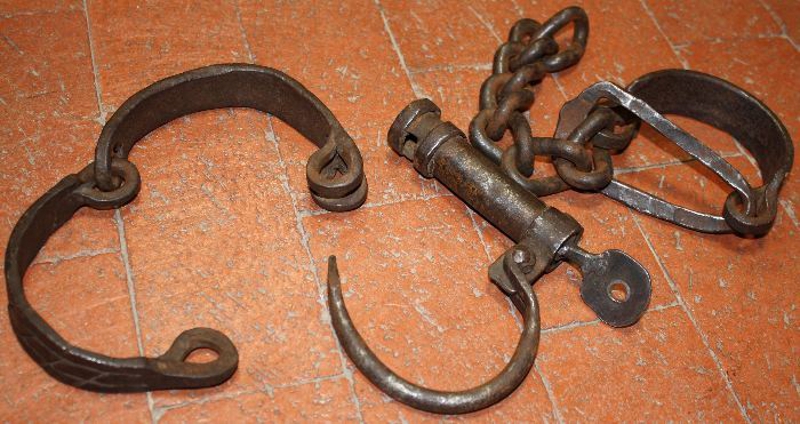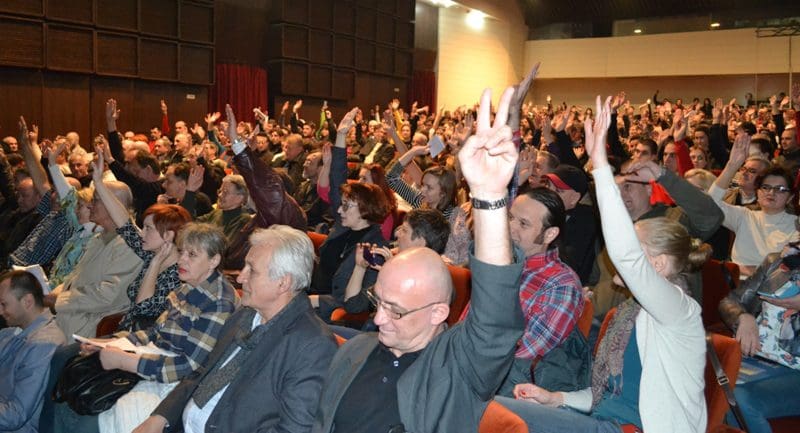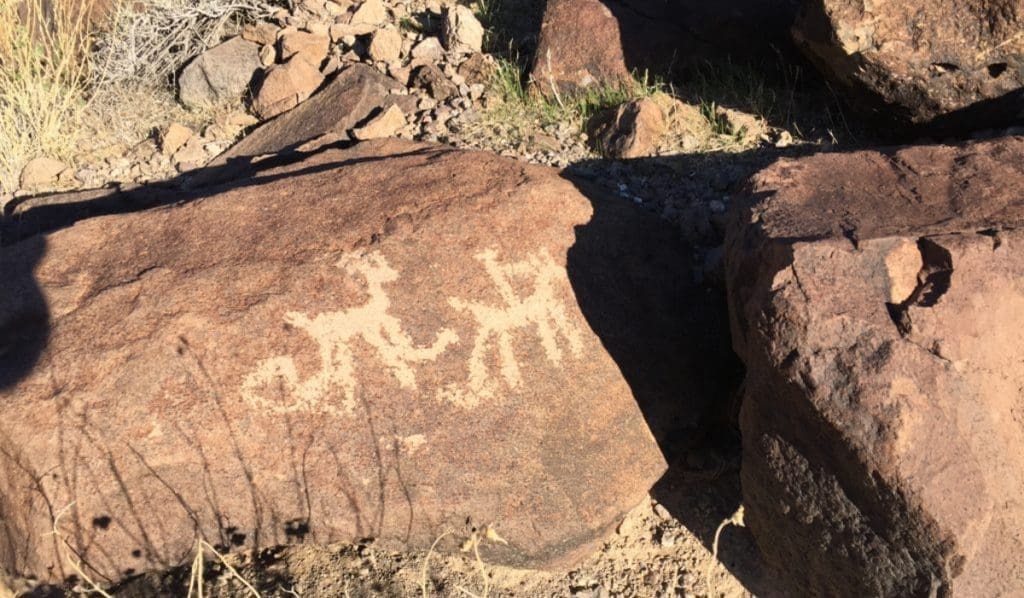AntiNote: The following is an extended excerpt of a radio interview, edited for readability.
On 15 February 2014, Chuck Mertz of This is Hell! Radio (Chicago) talked to Greg Grandin about his recent book The Empire of Necessity: Slavery, Freedom and Deception in the New World. Grandin asks us to acknowledge, reexamine and confront the legacy of slavery—in all its historical forms but in particular the brutal example of the trade on the Middle Passage—in our assessment of current political, social, and economic relations and institutions.
Looking out from Antidote’s home base in Europe (where a torrid and nearly unchallenged ascent of racist ideologies across the Continent can truly no longer be denied), and Switzerland in particular (where a referendum tightening immigration policy passed last month, accompanied by an across-the-board denial that the vote had anything to do with racial discrimination), we are moved to remind our readers that the philosophical lessons Grandin sets out are applicable not only in North America, as so many here—not without an air of relief and reproach—seem to think, but everywhere.

In the 1770s the Spanish began to use phrases associated with today’s society—they began to privatize and deregulate the slave trade.
Chuck Mertz: On the line with us right now: Greg Grandin. Good morning, Greg.
Greg Grandin: Good morning.
CM: Greg is the author of The Empire of Necessity: Slavery, Freedom and Deception in the New World and one of my very favorite guests. He is the author of a number of prize-winning books, including Fordlandia: The Rise and Fall of Henry Ford’s Forgotten Jungle City, which was a finalist for the Pulitzer Prize in history as well as for the National Book Award and the National Book Critic’s Circle Award.
You know what, this is a good place to start this conversation: how much do you and I, right now, benefit from our history of slavery?
GG: The modern world that we live in is created by slavery. Oftentimes the national discussion about reparations focuses mostly on the negative effects of slavery in terms of uncompensated wages that some people have calculated at a trillion dollars, counted in today’s currency. Other people focus on the post-Abolition harm done as a result of discrimination, the exclusion of African Americans from the New Deal or from mortgage programs that would have benefited them.
But I think that focus obscures the way slavery contributed to other institutions. Medicine, insurance, what we know of as modern Christianity and modern international law come out of defending slavery, fighting against slavery, or trying to reform slavery. Modern philosophy, the way we think of the individual, is a result of slavery. Brooks Brothers, the plush clothing company from New York, had its start selling coarse clothing to slave plantations. The insurance company Aetna got its start underwriting slaves and slave voyages. So there are ways in which we benefit just in the way that we live our lives and the institutions we live our lives through.
CM: So here’s the thing—a friend of mine once told me that he didn’t believe in reparations for the descendants of slaves because he didn’t enslave people and he didn’t benefit from it because he isn’t from the 1850s. This happened 150 years ago. It doesn’t have anything to do with him. What would you say to somebody who says that there shouldn’t be reparations because they aren’t benefiting from slavery?
GG: Well, look, there’s a lot of technical questions about trying to seek social redress, or redress through the court system. How would you define the claimants, how would you define the defendants, how would you define the damages? These are real questions that would need to be answered.
But I think that in this country, the way we deal with our past is often through litigation. And it is the debate over reparations which forces these questions onto the agenda, and forces us to confront the reality of how much wealth and value was created through slavery. And the wealth and profits generated from slavery went well beyond just the cotton that slave plantation owners sold to Britain or the sugarcane that slaves cut. It capitalized banks, it capitalized insurance companies in the North. The North’s economic diversification and industrialization were financed by slavery.
And that’s just in economic terms. Again, the institutions that we live our lives through—the churches, the universities—were shaped by the experience of slavery. Centuries of buying and selling human beings and transporting them across continents, across oceans, created the modern world. And it is through the reparations debate that these issues are addressed and confronted.
CM: Before I do any research for a guest, Greg, I try to think of the most general questions that are often based on the most horrible opinions in the world. One of the things that seems always to be brought up in the discussion of slavery is the complicity that Africans had in the slave market, that the slaves were being sold off by Africans. What do you say to those who blame Africans for slavery, who say that they were complicit?
GG: Well, two things. One: it is true that slavery was the normal condition of social relations for millennia. The idea of individuals buying and selling their labor as free men and women in the free labor market is a new thing, coming out of the Age of Revolution and the Enlightenment. The kinds of slavery that existed were different in Africa, different in Europe, different in the Middle East, in Russia, in Asia. There were different degrees and variations of forced labor.
But what emerges with the Atlantic economy is qualitatively different in terms of the work that was demanded, in terms of the absolute treatment of people as chattel, in terms of the brutality, in terms of the equation of forced labor with skin color, in terms of the distances traveled and the massive number of people that were ripped out of their homes—12.5 million people by some estimates, and that’s probably a conservative estimate.
The second thing I would say is that European intervention in Africa disrupted social relations, communities, and balances of power and led to the wars and conflicts among ethnic groups that became a source of slaves. So yes, it is true that like all social systems, people participating are complicit in different ways, but I think that we could step back and make a broader moral judgment about degrees of responsibility and degrees of oppression.
If we were really to consider the role of Islam in New World slavery, we’d have to realize that Islam was present at the creation of many of the institutions we think of as comprising the modern world.
CM: What caused that particular slavery to become so brutal?
GG: It had to do with the discovery of the New World as a source of resources for Europe under the system of mercantilism, the extraction of gold and silver—and mercury to amalgamate the gold and silver—and then eventually the creation of plantation economies in the Caribbean. The demand for labor became exponentially greater than at any time in the past with the creation of the Atlantic market and the flowing of minerals and crops from the Americas into Europe. The Atlantic market system was qualitatively different in terms of scale, in terms of the amount of wealth produced.
Slavery existed in the Americas from the early 1500s forward, when the Spaniards and the Portuguese brought the first slaves to the Caribbean, but it was really in the 1770s when they began to use phrases associated with today’s society—when they began to privatize the slave trade or deregulate the slave trade.
Spaniards were very frank about trying to institute what they called “Free Trade in Blacks” as a way of jumpstarting the colonial economy. Prior to that, under the terms of Spanish mercantilism, slavery was horrible and brutal in all the ways we just talked about, but it was, at least in principle, tightly controlled by a strong state in which only a select number of monopolies had the right to import slaves into a select number of ports: Havana, Cartagena, and a few others.
But starting in the 1770s, there was a big push by Spanish-American merchants for a Free Trade in Blacks. They wanted more “liberty,” and by that they meant more liberty to buy and sell Africans as they would. And slaves started to pour into the Americas. More Africans came into Montevideo—which is the starting point of the story that I tell in The Empire of Necessity—in 1804 than in any previous year.
This pre-dates what we think of when we think of slavery in the United States. Slavery in the United States really gets going after the War of 1812 with the British, the opening up of the West, the invention of the cotton gin. But all of the stuff that we think of as chattel slavery in its most brutal antebellum expression was going on for decades before in Spanish America.
CM: As an introduction into this discussion of slavery, you use a Herman Melville short story that is spectacular. It is a great example, a great way to get into the mind of the reader. But one of the things you point out in your book is how this all happened during the Age of Revolution; this all happened during the Age of Liberty. That is such an odd contradiction, for me, that slavery is exploding at a time when the ideas of freedom and democracy are also growing.
GG: Fifty years ago a historian, Edmund Morgan, talked about the paradox of freedom and slavery in the Americas and how the idea of freedom was dependent on slavery in all sorts of ways. Slavery, as we talked about, created the material wealth which generalized notions of freedom, independence and individualism, giving more and more people in the lower classes—white people—a sense that they had an interior life, that they had individual preference, they had individual rights.
And it generated the profits with which colonists were able to buy guns in order to fight the British and then, later on, the Spanish colonies were able to fight the Spaniards. There’s all sorts of ways in which slavery and freedom were intertwined.
CM: It always seemed that in K-12 history classes, slavery kind of existed in a vacuum. But one of the things that you point out in your book is slavery’s effect on culture, on society. How does one exist within a slave culture?
GG: Well, just think about all of the works of culture and literature that were produced in either defending slavery, or protesting it or reforming it. There’s all sorts of ways slavery was remarkably generative. You mentioned Herman Melville: there are ways in which Moby Dick itself was about the crisis that was confronting the United States in 1851 as it was careening towards civil war—the crisis over slavery, the crisis over expansion. But Benito Cereno, the story that basically inspired the book that I wrote, is really wrestling with the problem of slavery.
This goes back to your broader question: Melville himself, his position on slavery was complicated, but he was clearly an abolitionist (a small ‘a’ abolitionist; he didn’t trust the organized Abolitionists. He equated them with the Jacobins in France: he thought they were dangerously naive and they were going to basically steer the American Revolution into the shoals just like he thought the Jacobins did the French Revolution). He was clearly opposed to slavery. But he didn’t write too much about slavery itself as an existing institution; he tended to write about slavery and freedom in metaphysical terms.
CM: Let’s stick with Melville. You write, “the pas de trois between the New Englander Amasa Delano,”—this is in the story Benito Cereno—“the Spaniard Benito Cereno and the West African Mori, choreographed by Babo and other characters, is dramatic enough to excite the wonder of any historian, capturing the clash of peoples, economies, ideas and faiths that was New World America in the early 1800s. That Babo, Mori, and some of the rest of their companions were Muslim means that three of the world’s great monotheistic religions—Cereno’s Catholicism, Delano’s Protestantism, and the West Africans’ Islam, confronted one another on the ship.” Why is the presence of Islam so ignored most times when we read anything about slave history? How important was the presence of Islam for slaves?
GG: Well, some historians estimate as many as 10% of all Africans taken from the continent were Muslim. And they floated into all parts of the Americas. In Bahia, Brazil, the largest urban slave uprising in New World history, in 1835, was led by Muslims and it took place in the holiest month of the Islamic calendar, Ramadan, on the holiest day of that month, the Night of Power. There’s autobiographies of slaves that were Muslim in South Carolina, in Virginia, in other parts of the South and in Latin America. But the process of conversion to Christianity, be it Protestantism or Catholicism, was fairly relentless, and I think that the fact that Islam didn’t continue to exist as a cultural form within African American communities beyond the first or second generation of Africans is one of the reasons it’s ignored.
And another reason is obviously the problem of Islam in Western societies. Islam is considered something on the other side of the fault line, part of a “clash of civilizations,” and if we were really to consider the role of Islam in New World slavery, we’d have to realize that Islam was present at the creation of many of the institutions we think of as comprising the modern world.
It turned out that the slaves were actually running things. That they had risen up fifty-something days earlier, seized the ship, killed most of the Spaniards and demanded to be returned home to Senegal.
CM: And we would have to realize that not only was this nation built on the back of slaves—but worse than Black slaves, they were Black Muslim slaves, and I don’t think that’s something that most of America wants to discuss.
You write, “a captain ready to drive himself and all around him into ruin in the hunt for a white whale is a well-known story, and over the years, Mad Ahab in Herman Melville’s most famous novel Moby Dick has been used as an exemplar of unhinged American power, most recently of George W. Bush’s disastrous invasion of Iraq. But what’s really frightening isn’t our Ahabs, the hawks who periodically want to bomb some poor country, be it Vietnam or Afghanistan, back to the stone-age. The respectable types are the true ‘terror of our age,’ as Noam Chomsky called them, collectively, nearly fifty years ago today. The really scary characters are our soberest politicians, scholars, journalists, professionals and managers, men and women—though mostly men—who imagine themselves as morally serious and then enable the wars that devastate the planet and rationalize the atrocities. They are a type that has been with us for a long time.”
This is something that Noam Chomsky also taught me. What I truly believe is that it’s far scarier than anyone thinks it is, not because of some huge complex sexy conspiracy theory, but because this is the way of doing business. That is what we are, from incompetent to greedy to willfully ignorant, to unfairly judgmental and keenly afraid, nearly always willing to be duped by fear, believing that our problems are inevitable. That’s scarier than any big plan that some secret group has. Are more of us frightened by this than conspiracy theories? Are we more frightened by the process, the system that we live in, than conspiracy theories? Or do conspiracy theories still win?
GG: I mean, some conspiracies are true. Iran-Contra was a conspiracy that was true. But I think that conspiracy theories are a theory of power when power seems to be everywhere and it’s hard to pin down. In much of the world you don’t need conspiracy theories to explain the way the people who are extracting the resources are being controlled by the laws of supply and demand, by economic calculations made in the stock exchanges of Shanghai and Wall Street and London. These aren’t conspiracies, these are just the normal functionings of power.
But that extended quote is my way of comparing these two Melville characters: Ahab from Moby Dick—more famous, often taken as an emblem of unhinged American power—and Amasa Delano.
We’ve been talking around the set-piece which opens up my book, but it’s a fascinating story. Amasa Delano, a New England captain, a republican, a reformer—somebody who believes in the clarity of the modern world, that the modern world is a world of laws and institutions, and reason is dominant—boards a Spanish American slave ship in the South Pacific in 1804 and spends nine hours on board. The ship is distressed, in trouble, but he’s told that the reason there aren’t too many Spaniards on board is because it hit a storm, and then fever struck and most of the Spanish crew died. And he watched the operations of about seventy slaves, seventy West Africans, and he spent most of that time talking to the Spanish captain, Benito Cereno. And all that time Cereno was being tended to by his body servant, Babo, a West African who never left his side and seemed to be humble and loyal and attentive. And every time Amasa Delano asked Benito Cereno for a word alone, Benito Cereno said, “well, anything you have to say, you can say in front of my body servant.”
It turned out that the slaves were actually running things. That they had risen up fifty-something days earlier, seized the ship, killed most of the Spaniards and demanded to be returned home to Senegal. These were the West African Muslims that we mentioned earlier. And Amasa Delano, an experienced mariner in the middle of his third trip around the globe—and an ancestor of Franklin Delano Roosevelt—was completely blind to the social reality. He couldn’t see the social world around him. He had no clue at all that the West Africans were actually choreographing everything, that they were pretending not to be in charge.
When they ran into Delano’s ship they had two choices: they could have fled or they could have fought. But then they came up with this ingenious plan: it was like a nine-hour pantomime of the master-slave relation.
And these were desperate people. They had been on board for over two months, they were starving, two children had died of dehydration, and yet somehow they managed to summon up the inner resources in order to play the role of slaves. And this is all a true story. I use it to open up to this larger history, but this is the story that gripped Melville’s imagination half a century later when he wrote Benito Cereno.
The problem isn’t the paradox of slavery, it is the attempt to escape this paradox.
CM: Yeah, and it’s a great set-piece, it really is. It really does set up the story, and it works as a great frame throughout the entire book.
Just a couple more questions for you. What’s this connection you were making before, between this American individualism that a lot of Libertarians embrace—what’s the connection between that individualism and slavery?
GG: This goes back to the portrait of Amasa Delano. I think Amasa Delano, both the real Amasa Delano and Melville’s rendition, represented a new kind of racism. It wasn’t justified in theology or philosophical doctrine, or even law. It rose from the psychological need to define one’s freedom in relationship to another’s enslavement, to define absolute freedom in opposition to absolute slavery.
This is what Amasa Delano was. He understood his freedom. He was a new man of the American Revolution. He was “enlightened.” He believed in modernity, he believed in the rule of law and the institutions that go with it. But he defined that freedom in relationship to what he imagined to be the servitude and enthrallment of Babo and Mori and these other slaves.
And this touches on things we talked about earlier: the relationship, the paradox of slavery and freedom, the way freedom emerges out of slavery, the way slavery makes freedom possible. If our very institutions and ideas of freedom are rooted in slavery, I think this is one of the things that accounts for the enduring power of racism.
Tea Partiers, for example, can’t help but talk about healthcare in terms of secession or nullification. They can’t help but talk about taxes as a form of slavery. All of these things, this vision of a state impinging on individual rights, is so bound up in the institution of slavery that it just can’t be shaken off. Whether people are individually racist, who knows? I don’t know. But I would argue that their conception of individualism is so deeply embedded in the history of slavery that those two things are inseparable.
Hence the first African American President comes into power after this horrible foreign policy fiasco and this 2008 economic meltdown, and he’s charged with re-stabilizing American power on a more sure footing, and he tries to do that through a mild program of government intervention, and it’s held up as if he’s Stalin incarnate. In many ways, he’s Babo, right? The Right treats him as if he was that loyal slave tending to Benito Cereno but is really hatching this plot to steer the ship of state into the rocks. And the fact that the real West Africans were Muslim just adds to the historical irony of it all.
CM: This is why I love having Greg Grandin on the show. One last question for you Greg, and as with all of our guests it’s the Question from Hell: the question we hate to ask, you might hate to answer, or our audience is going to hate the response. You write, “in his memoir, Delano uses a now-obsolete sailor’s term horse market to describe the explosive pile-up of converging tides strong enough to scuttle vessels. It’s a good metaphor. That’s why the people on board the Tryal”—this is the slave ship—“were caught in a horse market of crashing historical currents: of free trade, U.S. expansion and slavery, and of colliding ideas of justice and faith. The different routes that led all those involved in the drama in the Pacific reveal the fullness of the paradox of freedom and slavery in America, so pervasive it could trap not just slaves and slavers, but men who thought they were neither.”
Is slavery America’s original sin? Can we never, in the United States, have true freedom or democracy because of the legacy of slavery?
GG: No, I think we could. If there was an honest confrontation with the past.
The title of the book, The Empire of Necessity, comes from an epigraph from another Melville story: “seeking to conquer a larger liberty, man but extends the empire of necessity.” The way I read this is that he didn’t think the problem was that our notions of freedom were dependent on slavery; he thought the problem was the refusal to acknowledge that dependency.
The problem wasn’t the paradox of slavery, it was the attempt to escape the paradox, to skip off into the West or into the Pacific as if fleeing forward into the frontier would somehow solve the problem. I think what he imagined, and I would tend to agree with it, is that the task is to acknowledge the dependencies and necessities and the obligations that bind one to another. It’s not so much that we have this history of slavery—I mean, we have that history, other nations have their own particular horrors in the past—but it’s the refusal to confront the legacy directly and understand how much of our political culture is rooted in what we’ve been talking about today.
CM: It’s always a pleasure to have you on the show. Enjoy the rest of your weekend.
GG: Thanks so much, it’s always a pleasure.
Transcribed and printed with the permission of This is Hell! Radio. Listen to the full interview here:





